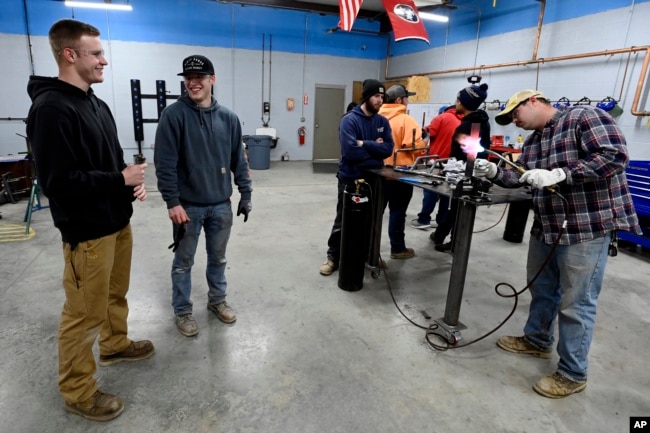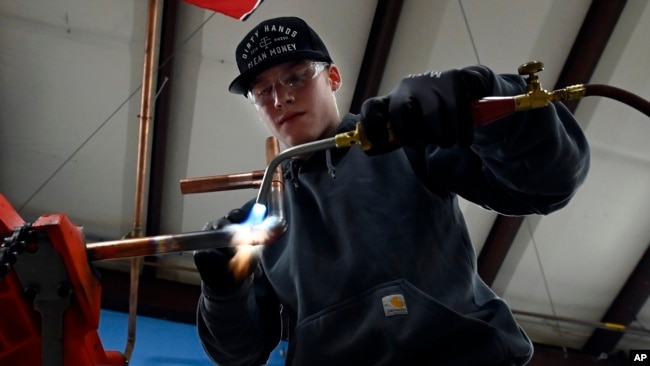大学進学に悩むアメリカの学生
学費は信じられない金額です。
しかしながら中国、インドなど海外の富裕層の留学生は増加しています。大学は収益を上げる為、積極的に海外留学を受け入れています。知的財産の流出の懸念と天秤にかけても利益を追求しているとしか考えられない状況です。
これって本末転倒なのではないでしょうか。
大学だけが道だとは思いませんが、学びたい学生には門戸を開いてほしいです。知力は国力なり!!(これは日本も同じ)
VOAで英語を学びましょう!!
大学進学をあきらめるアメリカの若者が増えている(和訳)
More Young Americans Choosing to Skip College
2023 March 19
3年前、COVID-19の制限により、学生たちの大学生活のあり方に大きな変化が起こりました。教室で学ぶのではなく、オンラインで授業を受けるようになったのです。キャンパスで生活する代わりに、多くの学生が自宅で暮らすようになりました。この変化により、大学教育を受ける価値があるのかどうか疑問に思う若者もいました。
現在では、ほとんどの大学の授業は元通りになっています。しかし、パンデミックのために大学進学を延期することを決めた若者の中には、いまだに進学しないことを選択している人もいます。高等教育費の高騰や学生の借金に対する不安は、より多くの若者が大学に進学しないことを選択する理由のひとつです。
その代わりに、彼らは働いています。多くの人は、それが自分にとって正しい決断だと信じています。
National Student Clearinghouseは、米国で大学に進学する人の数が2019年から2022年にかけて8%減少したと指摘しています。
労働専門家は、この落ち込みが長期的に米国経済に打撃を与えることを懸念しています。大卒者の減少は、医療から情報技術に至るキャリア分野の労働者数を減らすことになります。
しかし、教育に携わる人々の中には、最近の高卒者を "別格 "と見ている人もいます。ジャミア・ストークスさんは、テネシー州の教育団体SCOREに勤務しています。彼女は、学生たちは "働き方、時間やお金の使い方 "についてより現実的になっていると言います。
高校卒業後すぐに高収入の仕事が見つかるため、大学よりも仕事を選ぶ若者もいます。
AP通信は、テネシー州の大学生の年でありながら学校に通っていない若者たちに話を聞いきまし。ほとんどが働いています。1人は大学への進学を考えています。
ミア・ウッダードさん
ミア・ウッダードさんは、メンフィスとナッシュビルの間にあるテネシー州の小さな町、ジャクソンに住んでいます。ウッダードさんは、寝室に座って、大学の願書をオンラインで記入しようとしたことを覚えていると言います。今となっては、ちゃんと送れたのだろうかと心配しています。
どの大学からも返事は来なかったと彼女は言います。Wi-Fiの電波が弱かったから、願書が送れなかったのだろうかと。それとも、単に正しい情報を提供できなかっただけなのだろうかと、彼女は懸念しています。
ウッダードさんは、学校からのサポートはあまり受けられなかったと言っています。「彼らが私を信じていなかったからかもしれません 」と彼女は言いました。
ウッダードさんは、家族で初めて大学の学位を取得することを望んでいました。現在、彼女はレストランで働きながら、父親と一緒に暮らしています。自分の家を持つために、再就職先を探しています。しかし、まだ進学の可能性はあると彼女は言います。彼女の希望は、料理を勉強することです。
グレイソン・ハートさん
グレイソン・ハートさんもジャクソンに住んでいます。彼はいつも大学へ行くことを想像していたと言います。俳優か教師になりたいと思っていました。自分の目標に到達するためには、大学が最適だと考えていました。しかし、彼はパンデミックの時に考えを改めました。
高校を卒業して1年後、彼は大学に行っていません。彼は学校に申し込みましが、行かないことにしました。その代わり、ジャクソンで子どもたちのための演劇プログラムを運営しています。
大学進学への考えが変わったのは、パンデミック時に1年間、独学で多くのことを学んだからだと言います。学校へ行くという責任から解放され、自由を感じることができたと言うのです。
ハートさんは、「今やっていることに役立たない 紙切れ(卒業証書)と引き換えに、なぜ大金を払ってまで大学に通わなければならないのか」と考えたと言います。
ハートさんは、この先どうすればいいのかわからないと言います。「将来について、そしてそれが自分にとってどうなのか、心配はしています」と彼は言います。「でも今は、今のままでいいんだ、一歩一歩進んでいこう、と自分に言い聞かせているんだ。」
ブーン・ウィリアムズさん
3年前、ブーン・ウィリアムズさんは、大学進学を目前に控えたように見える学生でした。高校では難しい授業を受け、良い成績を取っていました。彼は動物科学を勉強しようと考えていました。
しかし、パンデミックによって学校が閉鎖され、授業がオンラインに移行すると、彼は興味を失ったと言いました。オンライン授業に参加する代わりに、彼は地元の農場で働くことにしました。馬や牛を扱う仕事をしたのです。
「僕は、学校に行くよりお金を稼ぐことに専念していました 」と彼は言います。
現在、彼は大学には通っていません。代わりに配管工の仕事をし、ナッシュビルの労働組合の専門家から学ぶために、夜間に授業を受けています。
今はまだ収入は多くありません。でも、経験を積めば、将来はもっと稼げるようになると思っています。
彼は、将来は、大学に進学した同級生よりも稼げるようになると考えています。
「長い目で見れば、僕は彼らの誰よりもずっと立派になるんだ」と彼は言っています。
次はどうする?
大学進学への関心が低いことは、特にマイノリティや低所得層の学生にとって気になるところです。2021年に高校を卒業したテネシー州の生徒のうち、大学に進学したのはヒスパニック系の生徒で35%、黒人系の生徒で44%に過ぎません。白人の生徒の半数以上が大学へ進学しています。
しかし、大学への関心が高まっているとの見方もあります。2022年に大学へ進学する生徒の数は、前年と比べて少し増えています。それでも、パンデミック前に比べれば、総数が圧倒的に少ないのです。
テネシー州はすでに、高校卒業後に教育を受け続けさせるという問題を抱えていました。2014年、同州はコミュニティカレッジを無料化しました。ますます多くの学生が大学に通うようになったのです。しかし現在、その数は少なくとも2009年以降で最も少なくなっています。
ヴィッキー・バンチさんは、ジャクソンの企業グループで労働力開発の責任者を務めています。高校卒業後すぐに高給を得られる限り、学生の数は低水準で推移すると考えている、と彼女は言います。
学生たちも同意見でした。仕事へのアクセスが容易で、お金を借りることに不安があるため、大学の魅力が薄れているのだと言います。
More Young Americans Choosing to Skip College
Three years ago, COVID-19 restrictions caused major changes to the way students experienced college. Instead of learning in classrooms, they took classes online. Instead of living on campus, many students lived at home. The changes made some young people wonder whether a college education was worth it.
Today, most college classes are back to normal. Yet, some young people who decided to delay going to college because of the pandemic are still choosing not to go to school. The rising costs of higher education and fears of student debt are among the reasons more young people are choosing not to attend college.
Instead, they are working. Many believe it is the right decision for them.
The National Student Clearinghouse notes that the number of people going to college in the U.S. dropped by eight percent from 2019 to 2022.
Labor experts are concerned that the drop will hurt the U.S. economy in the long term. A drop in college graduates will reduce the number of workers in career areas from health care to information technology.
Yet, some people who work in education see recent high school graduates as “different.” Jamia Stokes works for SCORE, an education group in the state of Tennessee. She said students are more realistic about “the way they work, about the way they spend their time and their money.”
Some young people are choosing work over college because they can find jobs that pay well right after high school.
The Associated Press spoke to young people in Tennessee who are of college age, but not in school. Most are working. One is considering going to college.
Mia Woodard
Mia Woodard lives in Jackson, a small town in Tennessee between Memphis and Nashville. Woodard said she remembers sitting in her bedroom and trying to fill out college applications online. Today, she wonders if she sent them in successfully.
She said she never heard back from any of the colleges. She wonders whether her weak Wi-Fi signal caused the applications to not get sent. Or maybe, she said, she simply failed to provide the right information.
Woodard said she did not have much support from her school. “It might be because they didn’t believe in me,” she said.
Woodard had hoped to be the first in her family to get a college degree. Today, she works at a restaurant and lives with her dad. She is looking for a second job so she can get her own place to live. She said there is still a chance she will continue her education. Her hope is to study culinary arts.
Grayson Hart
Grayson Hart also lives in Jackson. He said he always imagined going to college. He wanted to be an actor or a teacher. He thought college was the best way to reach his goals. But he changed his mind during the pandemic.
One year after finishing high school, he is not in college. He applied to schools but decided not to go. Instead, he is running a theater program for children in Jackson.
He said he changed his mind about college because he spent one year doing a lot of learning on his own during the pandemic. He said he felt free without the responsibilities of going to school.
Hart said he wondered why he should pay a lot of money to attend college in return for a piece of paper (a diploma) “that isn’t going to help with what I’m doing now?”
Hart said he is not sure what is next for him. “I do worry about the future and what that may look like for me,” he said. “But right now, I’m trying to remind myself that I am good where I’m at, and we’ll take it one step at a time.”
Boone Williams
Three years ago, Boone Williams was the kind of student who looked like he was on his way to college. He took difficult classes and got good grades in high school. He was thinking about studying animal science.
But when the pandemic closed schools and moved classes online, he said he lost interest. Instead of attending online classes, he went to work at local farms. He worked with horses and cows.
“I was focusing on making money rather than going to school,” he said.
Today he is not in college. Instead, he works on plumbing jobs and is taking classes at night to learn from experts in a trade union in Nashville.
He does not make much money right now. But he hopes to earn more in the future as he gets more experience.
He thinks he will one day earn more than some of his classmates who did go to college.
“In the long run, I’m going to be way more set than any of them,” he said.
What next?
The lack of interest in college is concerning, especially among minority and low-income students. Among students from Tennessee who finished high school in 2021, only 35 percent of Hispanic students and 44 percent of Black students entered college. Over half of white students went to college.
But there is some thought that interest in college is going up. There was a small increase in the number of students going to college in 2022 compared to the year before. Still, the total number is far lower than before the pandemic.
Tennessee already had a problem getting students to continue their education after high school. In 2014, the state made community college free. More and more students started going to college. But today, the number is at its lowest since at least 2009.
Vicki Bunch is the head of workforce development for a business group in Jackson. She said she thinks the number of students will stay low so long as they can get paid well right after high school.
Students agreed. They said easy access to jobs and concerns about borrowing money have made college seem less appealing.
Words in This Story
campus –n. the location of a college or school
graduate –n. a person who has completed a school program and earned a degree
culinary –adj. having to do with working in kitchens or preparing food
focus –n. to center one’s attention or mind on something
plumbing –n. the pipes in homes and buildings that carry water in and out
union –n. a working group of people with similar skills or training that negotiates for jobs together
set –adj. the state of being comfortable or without major worries
income –n. the amount of money someone makes in order to live each year




